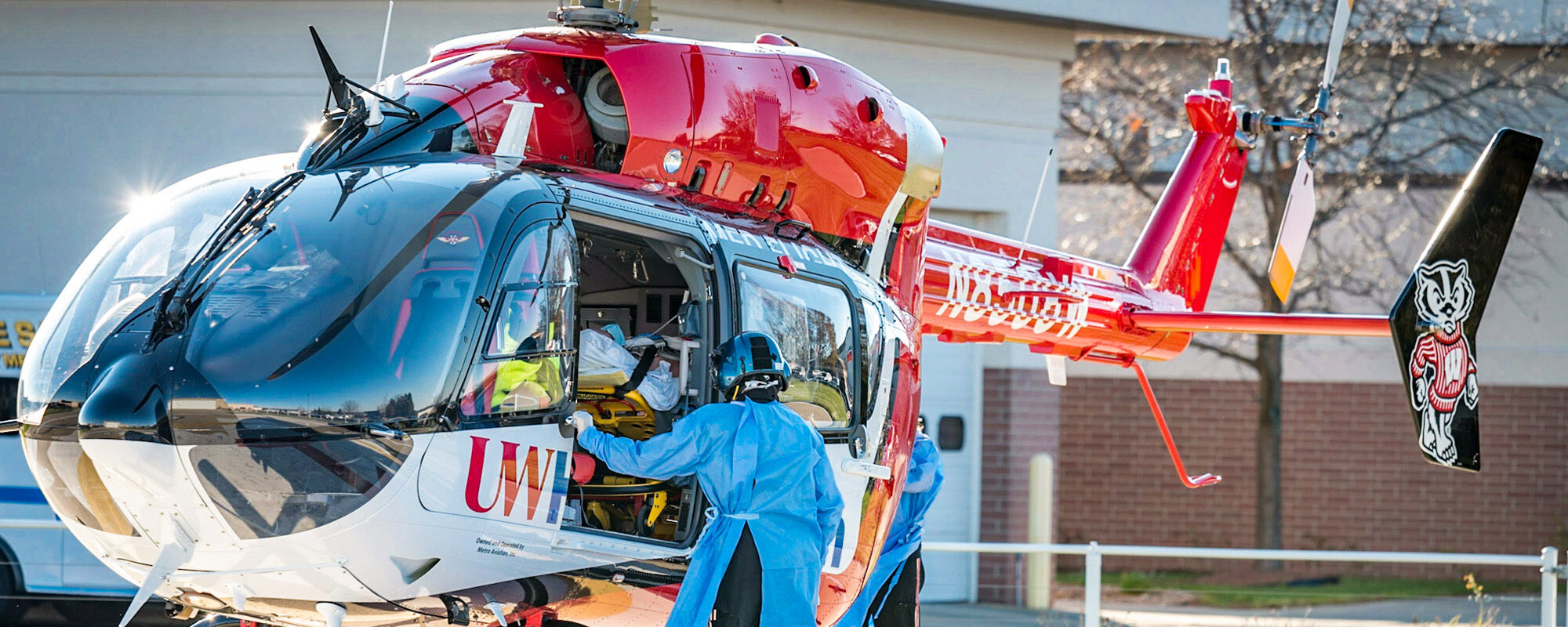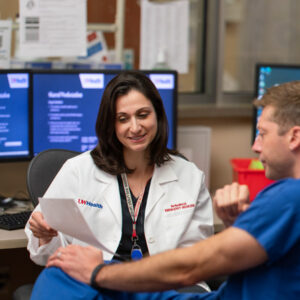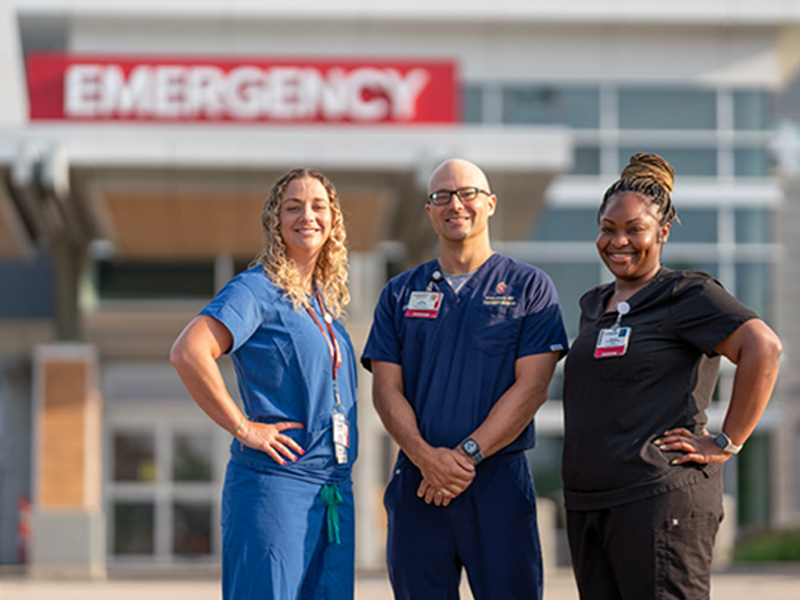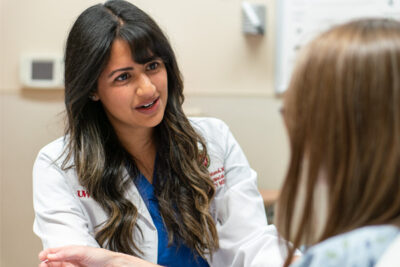Harari, Bailey and Grist Receive Belzer Award
The Folkert O. Belzer Award is the highest honor the University of Wisconsin School of Medicine and Public Health (SMPH) bestows upon its faculty members for their lifetime achievements.

In 2024, the BerbeeWalsh Department of Emergency Medicine (DEM) marked a decade of outstanding patient care, education, and research as an academic department at the University of Wisconsin School of Medicine and Public Health (SMPH).
“There was no academic emergency medicine at UW–Madison when I joined the school’s faculty in 2006, but there was incredible potential,” says Azita G. Hamedani, MD, MPH, MBA, founding division chief of emergency medicine from 2009 to 2014, then founding chair of the department upon its creation. “With Dean Robert Golden’s support, we set a goal to build one of the best emergency medicine programs in the country. Ten years later, we have accomplished more than I ever hoped or envisioned.”
The department has quickly become a national leader in academic emergency medicine, spurred by a transformative gift from James Berbee, MD, MS, MBA (PG ’14), and Karen Walsh, who have longstanding ties to the department and university. Their gift supported a rapid expansion of the department’s clinical footprint, educational programs, and research enterprise, led by Manish N. Shah, MD, MPH. Having been recruited to the department in 2015 to build its research portfolio, Shah stepped up to helm the department as chair in 2022.
“We take pride in the incredible things our department has achieved and the trajectory we’re on to address some of the greatest challenges in emergency medicine today,” Shah says.
DEM’s 70 physicians and 26 advanced practice providers deliver critical, time-sensitive care to nearly 120,000 patients annually at four emergency departments (EDs) in Madison.

The flagship BerbeeWalsh Emergency Department at University Hospital, part of UW Health, provided care for nearly 70,000 adult and pediatric patients in 2023. The state-of-the-art facility handles the region’s most serious and complex emergency conditions, including traumatic, infectious, oncologic, and cardiac emergencies. Innovations like its Extracorporeal Cardiopulmonary Resuscitation Program — a collaborative with cardiac surgery — and operational innovations like CareSTART — a physician-staffed triage/fast-track area — tackle big challenges with even bigger ideas.
The ED at UW Health East Madison Hospital is DEM’s fastest growing site; its annual patient census has more than tripled since opening in 2015. To meet the rising demand for emergency care, particularly for the sickest patients that only UW Health can care for, the health system is expanding both EDs, with plans to open nearly 60 new patient care rooms by 2026.
The dedicated pediatric ED at University Hospital, affiliated with American Family Children’s Hospital, is a regional leader in specialized emergency care for children. The unit’s team has grown from three to 10 fellowship-trained pediatric emergency medicine physicians who have built strong partnerships across UW Health Kids, ensuring 24/7 care and access to specialized emergency services for its most vulnerable patients.
At the William S. Middleton Memorial Veterans Hospital’s ED, an expansion to round-the-clock coverage by board-certified emergency physicians has been complemented by nationally acclaimed quality-improvement initiatives. This ED recently earned Level 2 Geriatric Emergency Department Accreditation from the American College of Emergency Physicians — one of only three in Wisconsin.
Turning 40 in 2025, UW Health Med Flight predates DEM. Since its inception, this premier critical care transport service has added three helicopters and opened three new air bases to better serve the region. By expanding its resources and capabilities, Med Flight’s team of highly trained physicians, nurses, and respiratory therapists can deliver world-class emergency care to more critically ill and injured patients across the upper Midwest. The team’s use of advanced technology in the field, such as carrying whole blood and transporting patients on extracorporeal membrane oxygenation, known as ECMO, continues to improve trauma care and health outcomes in the region. Med Flight’s role in the UW Organ and Tissue Donation program further underscores its life-saving impact.
The last decade has seen unprecedented progress in the department’s educational mission. Its residency program has grown from 18 to 39 residents, providing future emergency physicians with comprehensive training in academic and community settings. In addition to its landmark “3+1” training model, which offers residents a capstone year of protected niche training after graduation, DEM now sponsors 10 fellowship programs, many accredited, in areas such as emergency medical services, critical care, global health, medical education, and ultrasound.
From community medical directors to residency program leaders, professional sports team physicians to institutional directors of disaster medicine, DEM has recruited and graduated the brightest up-and-coming leaders in its specialty. A growing alumni network is working to advance health care practice, education, and policy worldwide.

It is no surprise that emergency medicine has become a top specialty choice for students at SMPH. The field is now a required rotation for medical students, providing early exposure to the fast-paced, multifaceted specialty. Beyond traditional medical education, DEM’s commitment to inclusivity extends to exceptional opportunities for students from disadvantaged backgrounds and those passionate about serving marginalized communities.
Research is a cornerstone of the department’s impact.
“We are among the most highly funded research programs in emergency medicine, making profound discoveries that are being translated into practice and improving patient care,” says Shah.
The Department of Emergency Medicine leads groundbreaking research programs in brain health, infectious disease, informatics, and more. Much of this work focuses on improving care for older adults, particularly those with dementia, by enhancing emergency care and transitions to home and community care.
Its innovative Emergency Department Research Coordinator program, launched in 2016, has enrolled thousands of patients into studies led by UW–Madison and industry researchers, including medical device trials. This program serves as a national model that allows investigators to efficiently and effectively carry out high-quality studies.
At the core of DEM’s mission is a commitment to humanism in medicine. Every aspect of its work is guided by the belief that health care should respect the dignity of each patient, in addition to treating illnesses and injuries. This patient-centered philosophy is reflected in the department’s holistic care, particularly for vulnerable populations, ensuring that emotional and psychological well-being is always considered alongside physical health.

The department’s influence continues to grow. Holding leadership roles across SMPH and UW Health, emergency medicine faculty members are helping shape the future of health care delivery and education, to best serve patients and learners throughout the enterprise.
As it celebrates 10 years as an academic department, the BerbeeWalsh Department of Emergency Medicine’s commitment to remarkable health care will continue to drive it forward, always focused on turning adversity into opportunity and improving emergency care in Wisconsin and beyond for decades to come.